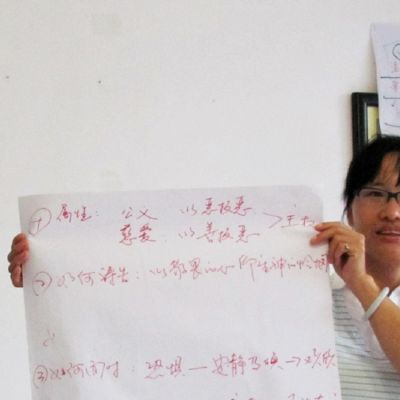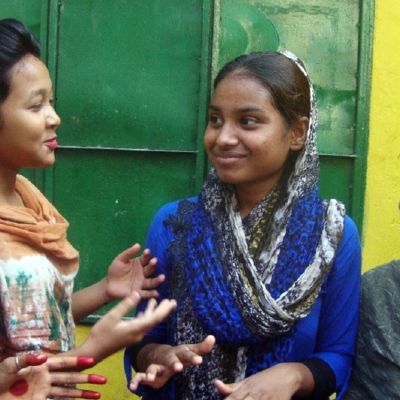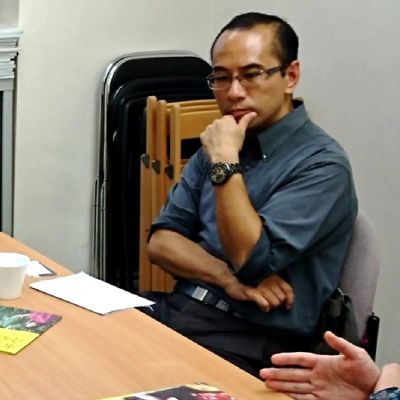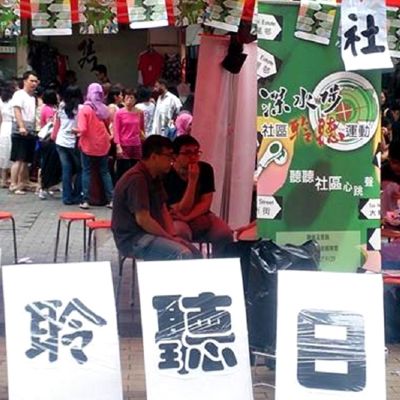Banner image: As a peer educator, Taslima (middle) often catch up with other girls in the community to learn about issues they are facing
Every individual has their rights despite their social status, age, gender, and education level. According to the United Nation’s Convention on the Rights of the Child, every child should have the rights to survive and thrive, to be protected, to participate and make their voices heard.
In Bangladesh, where 90% of its population are Muslims and 10% are Hindus, the caste system plays a significant part in the lives of Bangladeshis. People are categorised into different castes, and people who belong to the lowest social status group in the caste system are the Dalits, meaning “the oppressed”, or widely known as “the untouchable”. Dalits are often discriminated against by the society, and they can only do hideous work, such as collecting dead bodies, cleaning, and emptying trash bins. Poverty has forced many Dalit children to drop out of school to work or get married to share their families’ burden, violating their rights to survive and thrive, and rights to learn and to be protected.
In slum communities in Dhaka, CEDAR works with partner SATHI to educate Dalit children and youth about their rights and the importance of education by forming children groups and organising regular forums. In their groups and at the forums, children and youth discuss various issues, such as child abuses, school dropout, and early marriage; they learn to protect themselves and build strong support network. In addition, SATHI organises community groups and activities to promote child rights issues to parents, community leaders, and local policy makers, in order to raise community awareness and encourage stakeholders to establish policies to protect children and their rights.
In recent years, our partner trains committed youth group members to become Peer Educators as social agents to advocate for child rights. They also participate in People’s Institution (PI) meetings as a voice for the community’s children and youth.
Taslima is a Peer Educator, as well as a leader of a girl group. She is enthusiastic in educating her peers and parents about child rights issues. She almost dropped out of school and got married after she finished her junior school exam, because her parents could not afford her education. She was already a member of a youth group at that time, and she knew her rights to education, so she sought help from her group maters and a PI leader. The PI leader helped to arrange fund from the community’s Child Care Fund to support Taslima’s education, which eased the financial burden of her parents. Taslima continued her study and what happened has motivated Taslima to become a Peer Educator and group leader. She says: “I have dream to complete my education and get a good job, and have my own house where I will be able to teach others what I have learned.”
Our partner, SATHI, says they are grateful to see a significant decrease in school dropout rate. Girls are able to continue study and early marriages were prevented. Child abuse and child labour issues are being addressed in the community. CEDAR and partner aim to restore the rights, value, and dignity of Dalit children, empowering them to rewrite their future.
Content of this issue
Written and edited by: Tsun Wan Yan, Jojo Poon The act of poverty alleviation often gives the impression of aid workers carrying with them gifts of livestock and funds sponsoring children and their education to some remote villages. However, have you ever considered that the local churches are better suited in bringing continued and sustainable development and support to the people in need? To address the root causes of poverty for the poor, we must help the poor learn how to fish instead of relying on outsiders’ help. To prevent dependency on foreign aid, which would consequently hinder community growth, the average span of a development project is usually five to 10 years, and the development organisation will…
Written by: Pastor Daniel Ding During the past 10 years, the Church was able to integrate into the Chinese community through the government’s social service policy which encouraged non-profits to reach its residents. Yunnan was one of the pilot areas. Pastor Daniel Ding, Social Ministry Officer of Yunnan Christian Council, stressed that integration does not mean altering the truth we preach to fit in, but the challenge is to find a way to let our core values prevail. Pastor Ding is going to reflect on Isaac’s faithfulness described in Genesis 26:1-32 and his experiences in the Christian service scene in Yunnan, and let us see how God has always been with us as we serve our community. Isaac…
Banner image: As a peer educator, Taslima (middle) often catch up with other girls in the community to learn about issues they are facing Every individual has their rights despite their social status, age, gender, and education level. According to the United Nation’s Convention on the Rights of the Child, every child should have the rights to survive and thrive, to be protected, to participate and make their voices heard. In Bangladesh, where 90% of its population are Muslims and 10% are Hindus, the caste system plays a significant part in the lives of Bangladeshis. People are categorised into different castes, and people who belong to the lowest social status group in the caste system are the Dalits,…
Written and edited by: Tony Chan To echo this issue’s theme: Church and Community Mobilisation, we interviewed three pastors who are heavily involved in caring and serving their communities. They are Rev. Anders Chan Ming-chuen (Associate Senior Pastor of Mongkok Baptist Church), Mr. Jonathan Au (Lecturer of Christian Ministry Institute; Deacon at Kai Tak Peace Evangelical Centre), and Ms. Teo Yun-sarm (Conference Parish Worker of The Methodist Church, Hong Kong). They share their experiences in mobilising the Church to serve the community. It was an enriching conversation, touching on topics such as Gospel and social services, preaching social-related topics sermons, and advocating for justice. Though each of them had different views and approaches on social service, they all came…
Written and edited by: Tsun Wan Yan The Church’s role in Hong Kong’s social development dates back to early missionary times. However, in recent years, churches in Hong Kong were often accused of being absent from major social discussions, except issues that spiked its interest. For this issue’s “TAKING ACTION” section, we interviewed the Organiser of the social organisation, HK Citizens, Daniel Man, and asked him how they mobilise churches to respond to current issues through Community Organising. The Beginning: Non-profit Work in England HK Citizens oragnises community to work together for common good, which involves mobilising churches to bond with their communities. And this is not something new to Daniel. Daniel started off as a social worker…







